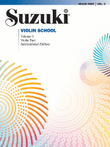Violin
SKU: AP.0150S
Volume 4.
Violin Part. Composed by Dr. Shinichi Suzuki. This edition: International. Method/Instruction; String - Violin (Suzuki); Suzuki. Suzuki Violin School. Book. 32 pages. Alfred Music #00-0150S. Published by Alfred Music (AP.0150S).
ISBN 9780739054628. UPC: 038081333854. English.
Teach violin with the popular Suzuki Violin School. The Suzuki Method of Talent Education is based on Shinichi Suzuki's view that every child is born with ability, and that people are the product of their environment. According to Shinichi Suzuki, a world-renowned violinist and teacher, the greatest joy an adult can know comes from developing a child's potential so he/she can express all that is harmonious and best in human beings. Students are taught using the mother-tongue approach. Each series of books for a particular instrument in the Suzuki Method is considered a Suzuki music school, such as the Suzuki Violin School. Suzuki lessons are generally given in a private studio setting with additional group lessons. The student listens to the recordings and works with their Suzuki violin teacher to develop their potential as a musician and as a person.
This Suzuki book is integral for Suzuki Violin Lessons. This revised edition of the Suzuki Violin School, Volume 4 features:
* Revised editing of pieces, including bowings and fingerings
* Additional exercises, some from Shinichi Suzuki, plus additional insight and suggestions for teachers
* Text in English, French, German, and Spanish
* Musical notation guide
* Fingerboard position.
Titles: Lullaby (Tonalization) (Schubert) * Lullaby (Tonalization) (Brahms) * Concerto No. 2 in G Major, Op. 13, 3rd Movement (Seitz) * Concerto No. 5 in D Major, Op. 22, 1st Movement (Seitz) * Concerto No. 5 in D Major, Op. 22, 3rd Movement (Seitz) * Concerto in A Minor, 1st Movement, Op. 3, No. 6 (Vivaldi/Nachez) * Concerto in A Minor, 3rd Movement, Op. 3, No. 6 (Vivaldi/Nachez) * Perpetual Motion, Little Suite No. 6 (Bohm) * Concerto for Two Violins in D Minor, BWV 1043, 1st Movement, Violin II (Bach).
For a complete list of the most recent printings by AMPV number, go to alfred.com/suzuki. This title is available in MakeMusic Cloud.
The International editions include an up.
About Suzuki Method
The Suzuki Method is based on the principle that all children possess ability and that this ability can be developed and enhanced through a nurturing environment. All children learn to speak their own language with relative ease and if the same natural learning process is applied in teaching other skills, these can be acquired as successfully. Suzuki referred to the process as the Mother Tongue Method and to the whole system of pedagogy as Talent Education. The important elements of the Suzuki approach to instrumental teaching include the following:an early start (aged 3-4 is normal in most countries); the importance of listening to music; learning to play before learning to read; -the involvement of the parent; a nurturing and positive learning environment; a high standard of teaching by trained teachers; the importance of producing a good sound in a balanced and natural way; core repertoire, used by Suzuki students across the world; social interaction with other children. Suzuki students from all over the world can communicate through the language of music.






























































